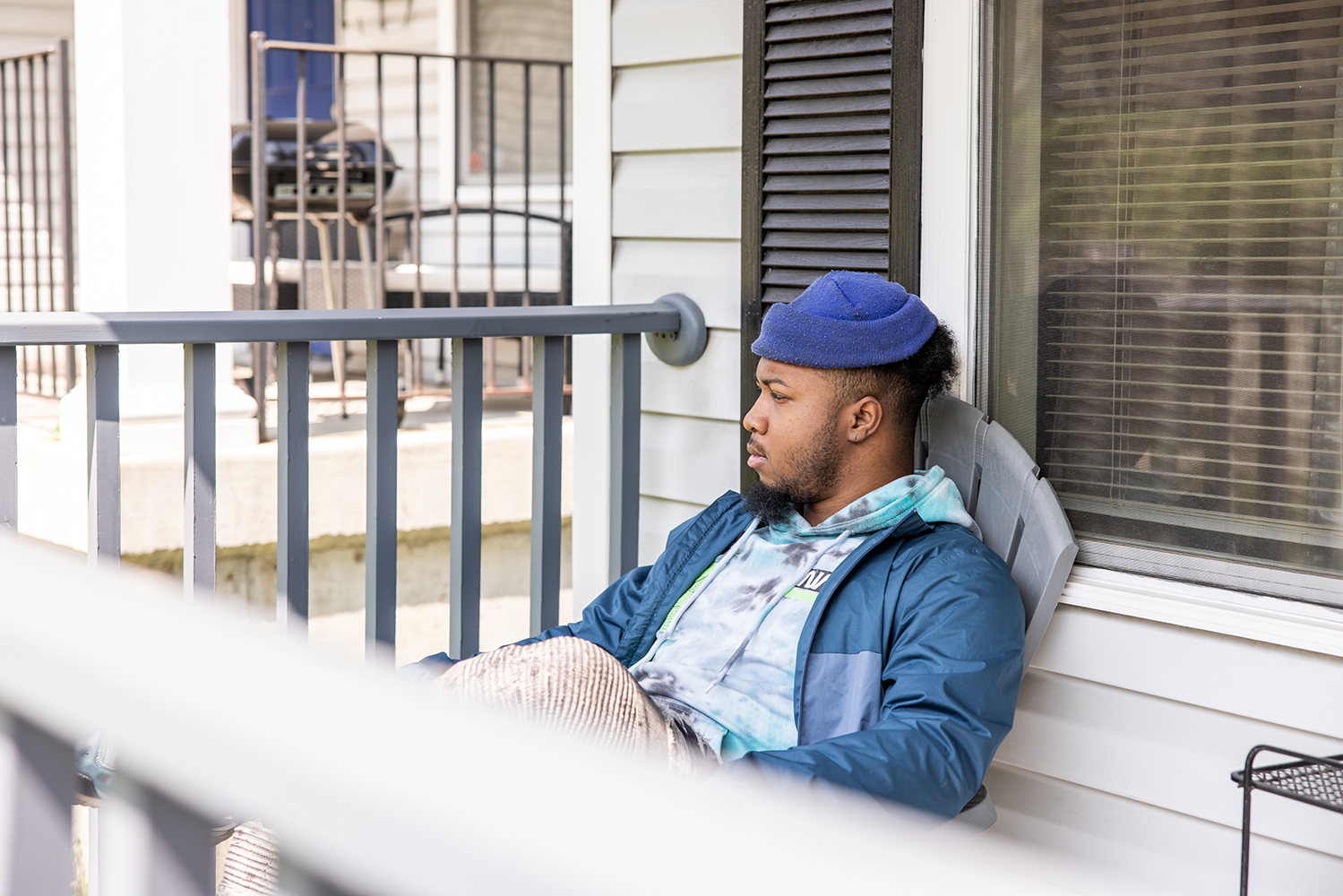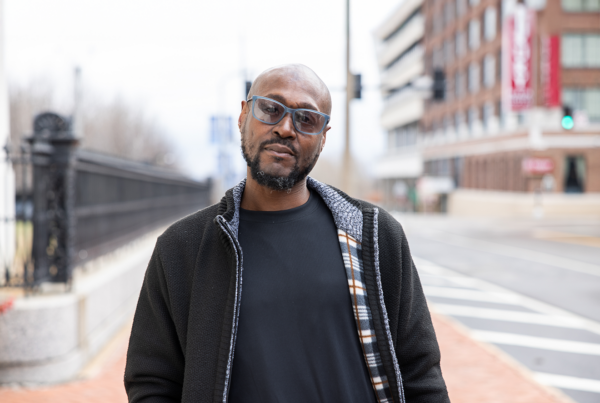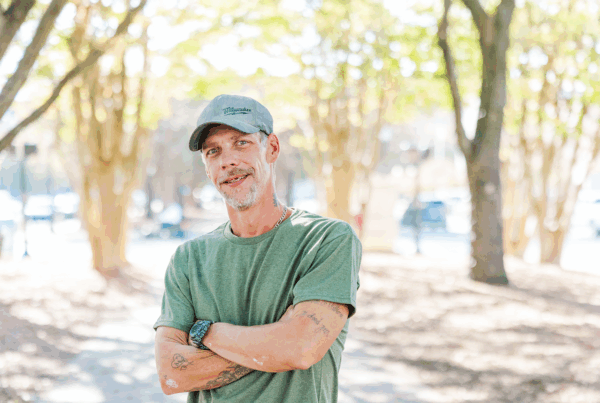When Mrs. Elfreda called the St. Louis County Sheriff’s Department on a late-summer day last year, she told the deputy responsible for taking her grandson to their hospital’s psychiatric unit that she had one request: Don’t hurt him.
“Don’t come into my house with guns drawn,” she told the sheriff’s deputy. “And when you come in, don’t come in rude.”
Mrs. Elfreda is a 60-year-old strong-willed and tender-hearted woman of faith and matriarch of the family. She’s also a fighter–the St. Louis native has survived three-strokes, two-heart attacks, and COVID-19.
Her grandson, Jaylen, had been recently diagnosed with paranoid schizophrenia and was struggling to come to terms with his illness. Despite several short hospitalization stays, Jaylen refused to take his medications and he had been growing increasingly more agitated and frustrated. Prior to his mental health crisis, he had never gotten into any legal trouble, but now his criminal cases were mounting.
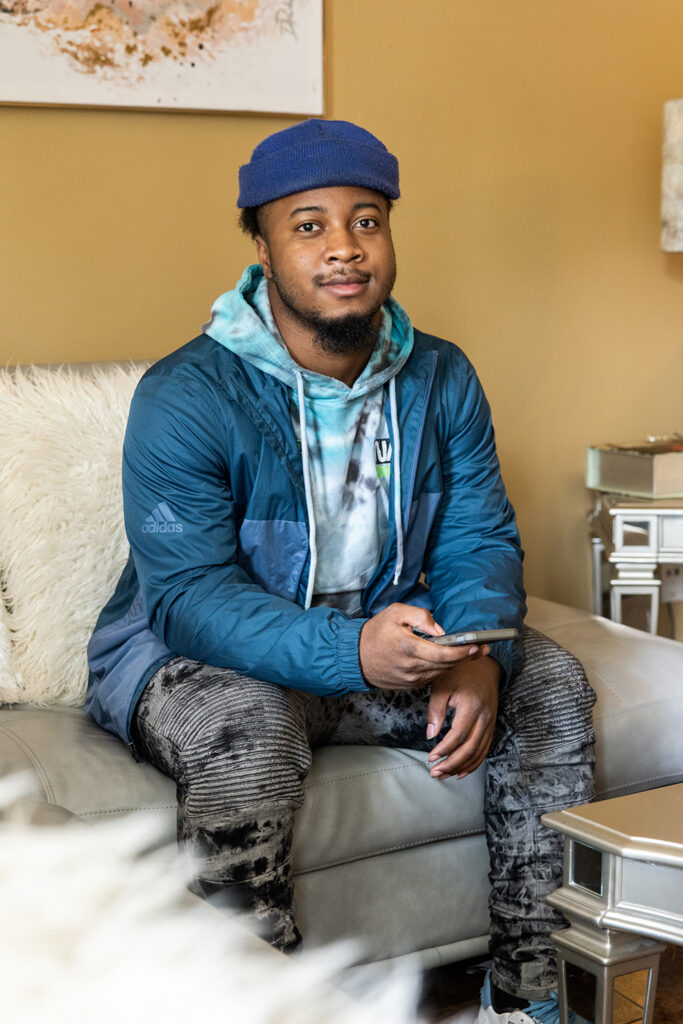
After exhausting all other options, Mrs. Elfreda felt she had no choice but to file an affidavit to have Jaylen involuntarily hospitalized for 30 days. A judge agreed and ordered the sheriff’s department to pick Jaylen up.
But Mrs. Elfreda was concerned for her grandson’s safety. Jaylen was a young Black man and his grandmother knew of several people of color in the community who had been injured by law enforcement during a mental health crisis over the years, including her own son, Jaylen’s uncle.
Mrs. Elfreda wasn’t about to let the same thing happen to her grandson. She was Jaylen’s most fierce protector and loudest advocate. The pair share a special bond.
Jaylen looks up to his grandmother as a role model. His love for her is overwhelming. Mrs. Elfreda enjoys cooking him breakfast and sometimes they play pool, reorganize the house or discuss bible verses. Other times they simply talk for hours on end.
“I wasn’t going to let the system take him away,” Mrs. Elfreda said. “He wasn’t going to turn into a statistic.”
Mrs. Elfreda and Jaylen’s experience is a lived reality for many people across the country.
Family members who have a loved one living with mental illness often struggle with how to best support them. Unfortunately, a person’s wealth often dictates whether or not someone is able to access timely and adequate mental health treatment.
Many people, such as Jaylen, rely on Medicaid and free public programs that have limited resources and capacity. Financially strapped families who are in the middle of an emergency or those who live in rural areas where services don’t exist often rely on 911.
When police respond to mental health calls, they can be ill equipped to handle the situation safely, increasing the chances of a fatal outcome. According to a 2022 report from Vera Institute of Justice, there were at least 104 people killed after police responded to someone having a mental health crisis.
Law enforcement involvement can also quickly derail a person’s life. This is especially true if the individual’s mental health crisis lands them in jail.
Families who cannot afford to post bail for relatives or send them into private psychiatric treatment facilities often feel hopeless. With nowhere to turn, many people with mental illness often end up cycling in and out of jail. As a result, people with limited income and communities of color have been increasingly bearing the brunt of this public health crisis.
The changes in her grandson’s behavior were subtle at first, but Mrs. Elfreda noticed it right away.
It was early-winter 2021, and the soft-spoken and humble young man was no longer going to church, writing poems or skateboarding. Then Jaylen stopped attending college and broke up with his girlfriend.
“Something is wrong with my grandson,” Mrs. Elfreda would tell people. “This isn’t him.”
Soon, Jaylen’s behavior grew erratic and unpredictable. He was quick to anger, yelled often and punched holes in walls and other things until his knuckles bled. This was a far cry from the kind, sweet and respectful young man his grandmother helped raise.
When doctors finally diagnosed Jaylen, 23, with paranoid schizophrenia, Mrs. Elfreda wasn’t surprised.
That’s because mental illness happens to run in their family.
Mrs. Elfreda was diagnosed with paranoid schizophrenia and PTSD more than three decades ago. She was shuffled in and out of different psychiatric hospitals until doctors finally found the right combination of antipsychotics to help drown the noises she was hearing. Doctors also diagnosed her son with several mental health conditions when he turned 16 years-old.
That experience propolled Mrs. Elfreda to spend a large portion of her free time volunteering for nonprofits organizations who helped support people in prisons who have a mental illness.
Mrs. Elfreda decided she wanted to spearhead Jaylen’s treatment plan and have him move back to her house. She felt her experience with mental illness combined with her connections and knowledge of available resources made her best equipped to help Jaylen.
“They had me on all types of medications and I was like a zombie,” Mrs. Elfreda said while recalling her own experience with mental illness. “ I knew how to get the right treatment for him and utilize all the resources we had. We had to be direct and follow up with everyone.”
Friends and family worried whether Mrs. Elfreda would be able to handle the stress. She had been recently hospitalized for heart problems and Jaylen’s outbursts were becoming more frequent and severe.
But she never wavered in her support for Jaylen. For over the next year-and-a-half, Mrs. Elfreda directed all her energy towards helping her grandson get his life back on track. Doing so wasn’t easy and their journey was long, complicated and painful, but she remained steadfast and committed.
“You never take your hand away from a person with mental illness,” she said. “You hold their hand until they realize they have a problem. When I went through my mental illness, my mother didn’t give up on me.”
One day in late February 2021, Jaylen was driving when he got into a verbal altercation with another driver. The situation escalated and police were called. Jaylen was arrested and taken to St. Charles County Jail.
During this time, Jaylen still didn’t believe he had a mental illness and was refusing to take his medications. Mrs. Elfreda was also struggling to get doctors and insurance to approve alternative treatment plans.
Prosecutors still charged Jaylen for alleged property damage and attempted assault in the first degree. The judge set Jaylen’s bail for $30,000. He was behind bars for about 12 days until Mrs. Elfreda learned through a nonprofit that The Bail Project might be able to help. She contacted the team and they posted Jaylen’s bond.
When he was released, Jaylen moved back in with his grandmother. But within two weeks he had another psychotic episode. He was placed on his second 5150 psychiatric hold. This 72-hour involuntary hold allows medical professionals to evaluate whether a person experiencing a mental health crisis is a danger to themself or others. Once Jaylen was released only a few days passed before he had another psychotic break.
Jaylen’s situation was starting to feel eerily similar to her son’s experience. About two decades ago, his mental health crisis led to several dangerous encounters with the police.
“My son was beaten by police officers and thrown in trash cans,” Mrs. Elfreda said.
He recently finished serving a 13 year prison sentence. She worried Jaylen faced a similar fate
After Jaylen’s third outburst, Mrs. Elfreda realized her only option left was to file an affidavit to have him involuntarily hospitalized. She reached out to several nonprofits for advice.
Grass-root organizations, such as the ones Mrs. Elfreda leaned on, have become a vital lifeline for low-income communities by linking people to direct services and public mental health programs that they otherwise wouldn’t know exist. Oftentimes, such community-based nonprofit groups are a person’s only recourse in getting legal help and learning how the criminal justice system works.
In recent years, there’s been a growing demand to reform the criminal legal system when it comes to how it treats people with mental illness. Dozens of counties across the U.S., including St Louis, have been calling on officials to invest more heavily in community-based organizations that help a person get on the path of recovery and initiatives that train law enforcement officers and provide alternatives to their response.
For Mrs. Elfreda, proactively accessing that type of individualized attention and one-on-one support for Jaylen was a game-changer.
“Whoever is helping the person with a mental illness, everything is up to them, because when you have a mental illness, the last thing on your mind is getting help,” she said. “You have to be able to utilize what you got and if you don’t then you’ll lose out and get lost in the system.”
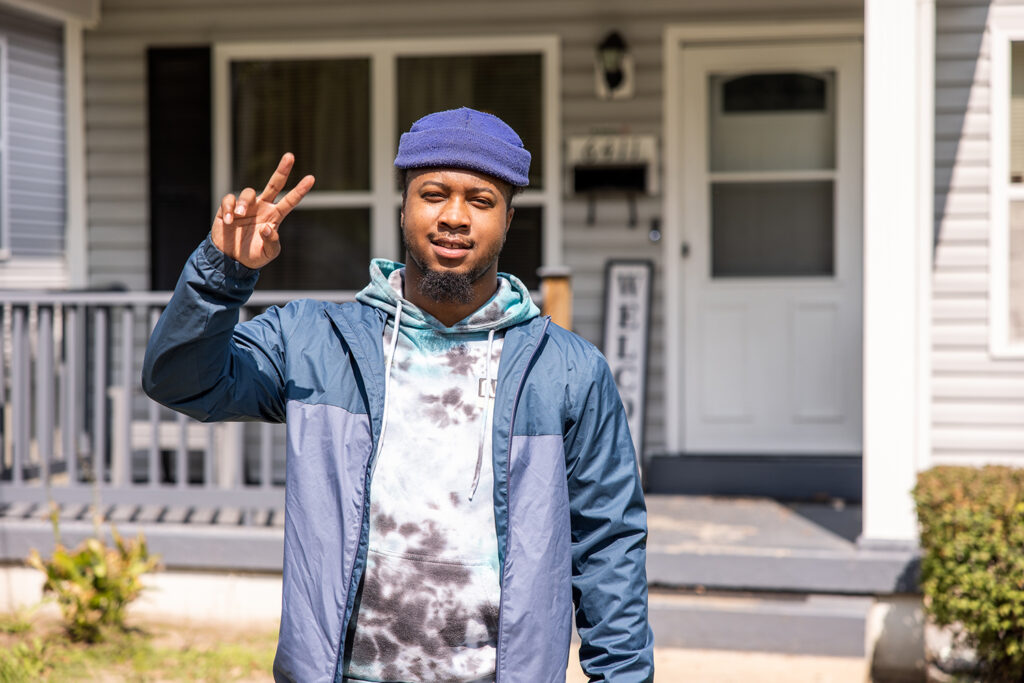
When the sheriff’s deputies arrived at her house, they reassured Mrs. Elfreda that Jaylen would be safe.
“We don’t have any guns pulled out,” they said. “We will do it the way you want to do it.”
Mrs Elfreda invited them inside. They heard Jaylen yelling upstairs.
“You are going to the hospital and getting on the right medication,” Mrs. Elfreda told Jaylen.
The sheriff’s deputy told Jaylen they preferred not to handcuff him. Jaylen listened.
After they dropped Jaylen off at the hospital, the sheriff’s deputy called Mrs. Elfreda and told her that they appreciated her calling them ahead of time and letting them know more about her grandson.
“I thanked them so much for being a blessing to my grandson,” Mrs. Elfreda said.
During his one-month stay at the hospital, Jaylen was put on the right medication and treatment plan. When he was released, everyone was in disbelief. They were astonished by how much he had improved. Jaylen was back to his former self, chatting with Mrs. Elfreda about the bible, playing music and skateboarding.
“I’m a person who has a heart. For so long I wasn’t aware I had a mental illness,” Jaylen said. “Everyone has obstacles in life. This is just another challenge I faced.”
Jaylen added that he appreciates the people who came into his life during that difficult time and how they still treated him with respect.
“The sheriff’s deputies, they knew how to talk to me and they were not being aggressive,” he said. “They were asking the right questions and asking if I was okay.”
“I want to thank those organizations because they helped me get my life in order and helped me have a more clear head,” Jaylen said. “I hope this sends a message that no matter what you get yourself into, you can always make a choice to make it worse or better for yourself.”
Mrs. Elfreda hopes people will learn from her family’s experience. She says one of the most important lessons she wants to pass down is the need for people to be proactive and relentless when seeking treatment on behalf of a loved one because that can become a deciding factor in whether or not they receive quality care.
“If me and Jaylen’s mother didn’t fight for my grandson and use every organization that we could out there, we would have lost him,” she said. “You gotta fight for that person because they can’t fight for themself.”
Jaylen’s attorney worked with prosecutors to lower his charge from 1st degree to 3rd degree assault. He will be serving a four month prison sentence.
“All I have to do now is to put my best foot forward and get myself out of the trouble I’ve gotten myself into,” Jaylen said.
Afterwards, he plans to move with his mother to Texas where he’ll go to college.
“My aspiration in life is to be independent. I’m a jack of all trades and I’m talented at different things,” he said.
Mrs. Elfreda gives credit to Jaylen for doing the tough work to recover as well as the people, friends and family who stayed humble and didn’t walk away from Jaylen.
“I’m proud of my grandson,” Mrs. Elfreda said. “I’m not saying it was easy. But it was worth it in the end. We came out victorious.”
Thank you for reading. The Bail Project is a 501(c)(3) nonprofit organization that is only able to provide direct services and sustain systems change work through donations from people like you. If you found value in this article, please consider supporting our work today.







